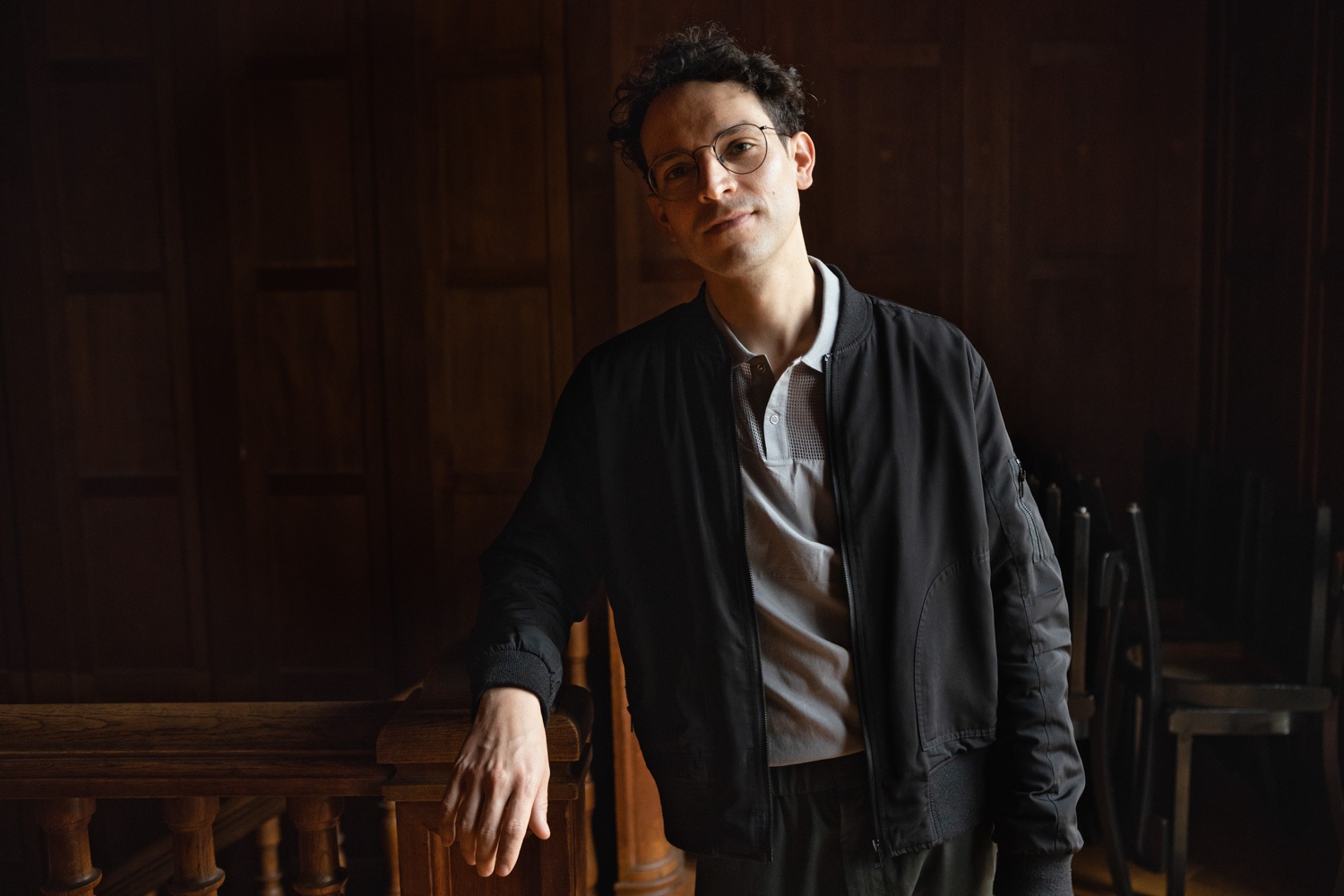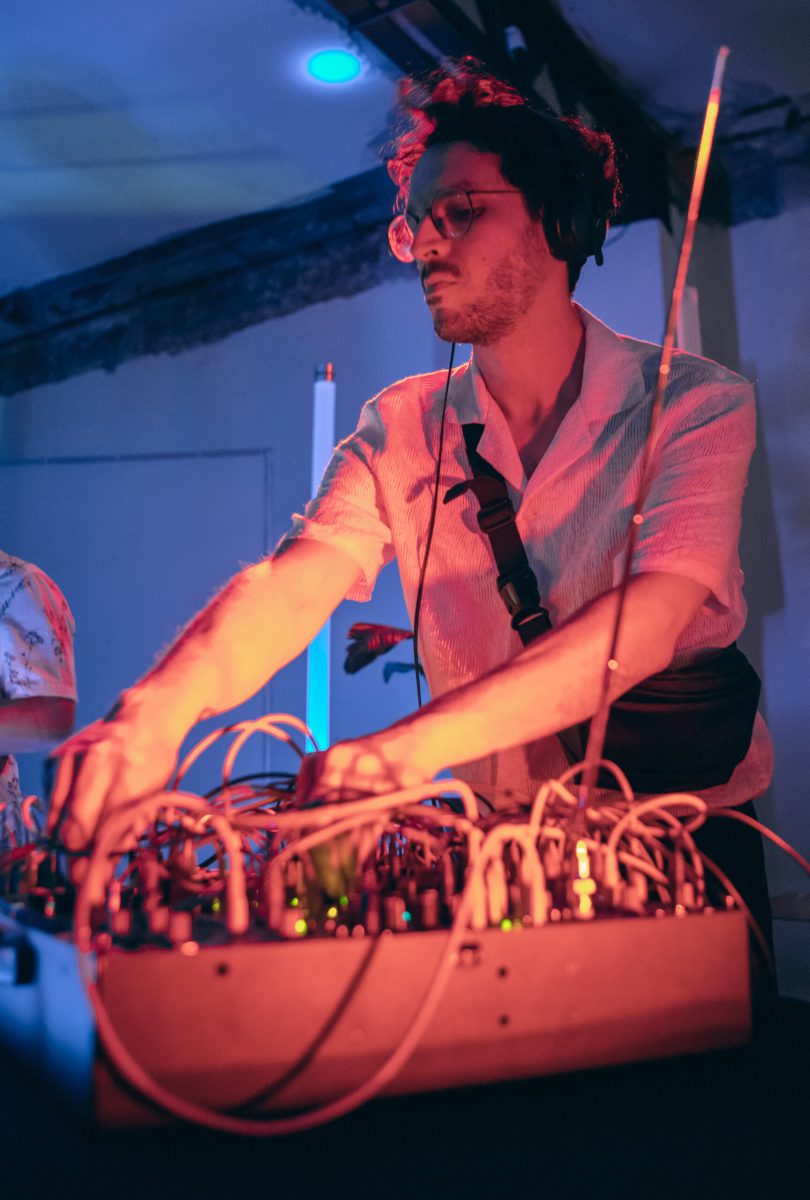Since the 2024/2025 season, Composer Andreas Eduardo Frank is the new Artistic Director & Co-Director of Basel’s Gare du Nord, one of the most important venues for contemporary music in Switzerland. Frank’s own works are multimedia, playful, humorous and often more political than one might think at first glance. A portrait by Jaronas Scheurer

Jaronas Scheurer
Andreas Eduardo Frank is the new artistic director of the Gare du Nord and he is also a member of the programming team of the Neue Musik Rümlingen Festival. As a result, he no longer gets to compose at the moment, as he says in an interview. “I have to be honest, I’ve spent a lot of the last ten years sitting behind a desk and putting notes on paper. It’s a lonely job and I’m actually a rather social kind of person. Curating is some kind of meta-composing, especially when you collaborate with people, exchanging and realising ideas together.”For Frank, the switch from composing to curating does not feel like a rupture. Even by looking at his earlier pieces, the collaborative nature of his compositional methods becomes apparent, which he emphasises in the interview: “I like to be inspired by the people I write for: What kind of sound, what kind of action, what kind of moment suits them?”
Yes, No, Maybe
However, not only his working methods have a strong social dimension, but also his very pieces. In the 2020 work Yes Yes No No, Yes No No No for violin, saxophone, accordion, percussion, electronics and video, played here by the Concept Store Quartet, Frank explored the dimensions of meaning of the words yes and no.
“I was interested in this grey area between yes and no, between one and zero. A ‘yes’ can sound beautiful, brutal, aggressive, strained, dismissive.” Frank started with these two everyday words and analysed their meaning and sound. Then there was the video aspect of the work. In the video as well as on stage, performers can be seen saying ‘yes’ and ‘no’ in different ways. “I found this an interesting constellation,” says Frank. “There are four performers on stage who all just say ‘yes’ and ‘no’. Then there are their digital avatars, who do the same. This creates very different social constellations between real performers and digital doubles, between individuals and group constellations, between various media levels. It’s a kind of social microcosm.”
New Music and politics
Andreas Eduardo Frank’s work thus has a clear socio-political dimension, which he immediately confirms: “I believe that music and art need to have an attitude towards society, to be reflected or can be heard in the music. Of course one can escape into music as a kind of ideal world. But reality is not intact.” The danger however, is for the music to become propaganda. Frank’s antidote to this is virtuosity: “I don’t want to tell anyone what he or she should think,” he says in the interview. “I want to create spaces of thought into which one can briefly dive and then a new space opens up the next moment. In this way, I try to establish some kind of virtuosity in thought form.”
Can one sing faster than the speed of light?
Another piece by Frank, Restore Factory Defaults (2017), is also centered on virtuosity. The starting point for the composition, which he developed with singer Anne-May Krüger, was the idea that one can sing faster than the speed of light. However, this actually absurd question puts us right in the middle of the extremely real everyday life of a musician. Frank’s piece is about virtuosity, competition and the power of performance.
In the piece, Anne-May Krüger sings against digital doppelgangers and the projected light choreography, which repeatedly leaves her in the dark. The various media levels such as video, light and audio recordings serve both as a virtuoso extension of the mezzo-soprano’s vocal abilities and as a media machine that she fights against.
Restore Factory Default is simultaneously a humorous examination of the limitations of human physical abilities, a multimedia virtuoso piece for a singer and a cultural-political reflection on the absurd competition between humans and machines. “On the one hand, I was interested in ‘enhancing’: So – how can I make this even more virtuoso with media means?” says Frank. “But at the same time, it’s a battle between the machine, which operates with light and the sound, which comes primarily from humans. I sometimes have the impression that behind this multimedia trend in contemporary music lies an escape from working with sound. I wanted to turn this around and therefore asked myself: can one sing faster than light?”

A safer harbour for sound experiments
This gentle criticism of contemporary music also brings us back to his current work as the Gare du Nord’s artistic director: “The Gare du Nord should be a place for sound experiments and a safe harbour for other approaches that may not belong to the mainstream. I want to dust off contemporary music and increasingly offer a platform to the younger generation.”
Jaronas Scheurer
Broadcast SRF 2 Kultur:
Kultur Kompakt from the 17th of October 2024 (from 00:25:51): Jaronas Scheurer reports on the opening production of this year’s season of the Gare du Nord.
Neo-profiles:
Andreas Eduardo Frank, Concept Store Quartet, Anne-May Krüger

